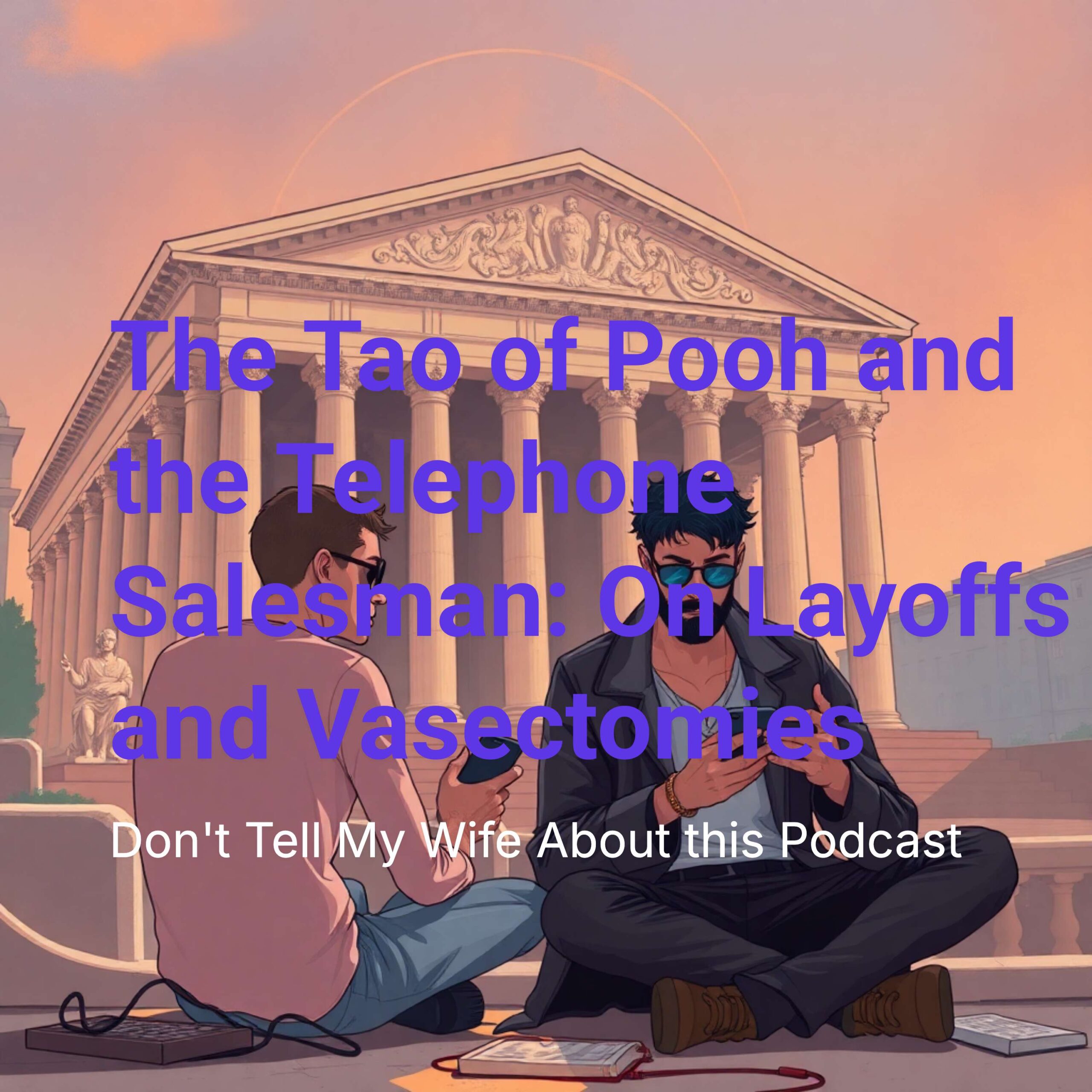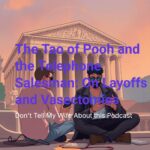The Tao of Pooh and the Telephone Salesman
The meeting began with a discussion about podcast recording logistics and personal anecdotes, including stories about work cultures and relationships. The conversation then explored cultural differences between the United States and Europe, particularly regarding work-life balance and societal expectations, with participants sharing experiences about moving between different countries and regions. The discussion concluded with reflections on personal growth, anxiety management, and Stoic philosophy, including stories about medical procedures and philosophical teachings, while exploring how to handle stress and maintain balance in various aspects of life.


Summary
Podcast Setup and Recording Plans
K and E discuss audio setup and sound checks for their podcast recording. They agree to aim for a longer recording time, rejecting the idea of a strict 30-minute limit. E mentions his wife is eager to hear their first podcast, partly out of curiosity and partly to verify its existence. E shares an anecdote about coming home late from work and his wife’s suspicions, highlighting the importance of trust in relationships. They briefly touch on work cultures in Korea and Japan that involve long hours and after-work drinking.
Anxiety and Productivity Challenges
E discusses his current situation, living in a hotel with his family during a move and preparing to relocate to Southeast Asia for a new job. He expresses anxiety about his employment situation, family responsibilities, and the need to be constantly productive. E mentions using a weight loss drug and trying to manage multiple tasks simultaneously. He acknowledges that his anxiety is partly due to his susceptibility to stress and his tendency to feel less valuable when not busy. E has tried using calendar reminders and to-do lists to manage his tasks but struggles with consistently implementing these tools. He also shares an anecdote about accidentally damaging his phone, highlighting his self-described carelessness with possessions.
Steve’s Journey From Business to Corporate
K shares a story about his British friend Steve, who ran a successful women’s swimsuit catalog company in the UK. Steve worked extremely hard for years, eventually burning himself out. After reading “The Tao of Pooh,” Steve decided to give up his business and pursue acting in Los Angeles. However, he ended up in a corporate job selling telephone services, which he disliked for many years. The story illustrates how the idea of giving up everything for a simpler life can be seductive but often difficult to maintain in reality. The conversation then shifts to discussing cultural differences between America and Western Europe, particularly regarding work-life balance and attitudes towards success.
Cultural Work-Life Balance Differences
The conversation revolves around cultural differences in work-life balance and societal expectations, particularly between the United States and Spain. K describes a friend’s relaxed lifestyle in Spain, which contrasts sharply with American work culture. E suggests that Europeans, especially in Spain, feel more connected to society and its obligations than Americans do. They also discuss the differences between New York City and European cities, particularly focusing on public transportation systems and cleanliness. The conversation concludes with a critique of New York’s subway system compared to those in other major cities.
Social Benefits: US vs Europe
The discussion compares societal expectations and attitudes towards social benefits in the United States and Europe, particularly Spain. E shares his observations about his Spanish cousins’ expectations of societal obligations and benefits, contrasting them with attitudes. The conversation touches on the spectrum of socialism, misconceptions about it in the US, and the balance between taxes and public services. K shares his experience moving from California to Texas, noting differences in taxation and public services. The discussion highlights the importance of being results-oriented rather than ideological when considering social policies and emphasizes the value of self-determination in different states and countries.
Overcoming Anxiety Through Mindfulness
Karl and E discuss anxiety and personal growth. Karl shares an anecdote about Nike founder Phil Knight feeling inadequate compared to Bill Gates and Warren Buffett, illustrating that wealth doesn’t guarantee contentment. They reflect on how media consumption can fuel feelings of inadequacy. E decides to take action by improving his use of his calendar and exploring voice-activated assistants to manage tasks more efficiently. He also plans to practice mindfulness to better recognize and manage his anxiety, acknowledging that conscious attention can help change thoughts and feelings.
Men’s Vulnerability and Stoic Resilience
E and K discuss the importance of men talking openly about their worries and vulnerabilities. They explore the concept of stoicism as a philosophical approach to dealing with life’s challenges, emphasizing gratitude and resilience. The conversation touches on gender roles, particularly masculinity, and how to construct positive models for their children. E expresses interest in intentionally shaping a masculine identity for his son, while acknowledging the flexibility of gender roles. They also discuss the current challenges facing men, including higher rates of suicide and unemployment, and the need to address anxiety and stress in men.
Overcoming Financial Struggles as Expectant Father
K shares a personal story about a challenging time in his life when he faced financial difficulties while expecting his first child and living in an expensive apartment. He describes feeling intense anxiety and stress but choosing to keep his worries to himself to protect his pregnant wife from unnecessary stress. K explains that he worked tirelessly during this period and would often seek solace by walking on the beach at night. Despite the hardships, he and his wife managed to break even financially by the end of the year. K reflects on this experience as a defining moment in understanding his role as a supportive partner and father-to-be.
Optimal Stress and Gender Roles
E and K discuss the concept of optimal stress levels and gender roles in problem-solving. They explore the idea that some level of worry can be productive, leading to better decision-making and problem-solving, but excessive worry can be detrimental. E introduces the concept of “eustress” versus “distress” and suggests that there’s an optimal balance between conscious attention and worry. They also touch on how cultural norms and gender identity influence behavior patterns. E shares his personal experience of managing stress in his current job situation, noting the importance of recognizing when stress becomes destructive and consciously trying to bring it to a more optimal level.
Embracing Life’s Challenges for Growth
Karl reflects on a stressful period in his life when he faced revenue decline while starting a family. He acknowledges that the experience was difficult but valuable, as it taught him resilience and gave him confidence to face future challenges. Karl and E discuss the merits of embracing life’s complexities and stresses, rather than seeking an overly simplified existence. They agree that choosing the right kind of challenges and problems can lead to personal growth and fulfillment, despite the difficulties involved.
Vasectomy Experiences and Personal Growth
E shares his experience of getting a vasectomy, describing his anxiety about the procedure and how he coped with it by making jokes. He reflects on the personal growth that comes from facing fears and building one’s own legend. K reveals he also had a vasectomy but had a different experience, with minimal pain. The conversation touches on their different experiences with anesthesia and recovery, with E expressing surprise at K’s easier recovery. They briefly discuss the importance of choosing a good surgeon and end with some light-hearted banter about vasectomy jokes.
Stoic Insights and Personal Anecdotes
The discussion covers several topics related to Stoic philosophy and personal experiences. Kay shares a story from Seneca about a wealthy, gluttonous man who is so disconnected from reality that he doesn’t know if he’s in the bath. They also discuss Seneca’s advice on moderation at banquets, applying it to life’s luxuries. The conversation then shifts to personal anecdotes and jokes. Towards the end, they talk about anxiety’s potential role in physical pain, particularly related to vasectomy recovery, and mention a Stanford study on chronic pain management through meditation.
